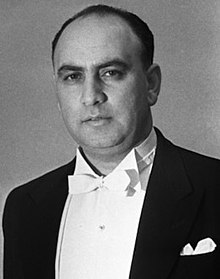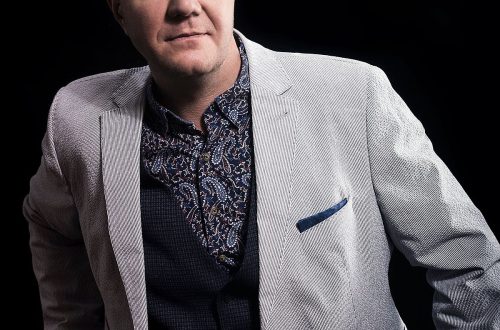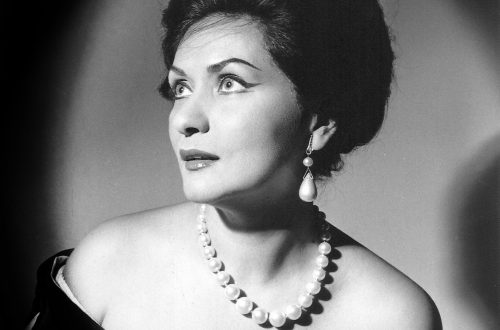
Pavel Gerasimovich Lisitsian (Pavel Lisitsian) |
Pavel Lisitsian
Born November 6, 1911 in Vladikavkaz. Father – Lisitsian Gerasim Pavlovich. Mother – Lisitsian Srbui Manukovna. Wife – Dagmar Alexandrovna Lisitsian. Children: Ruzanna Pavlovna, Ruben Pavlovich, Karina Pavlovna, Gerasim Pavlovich. All received higher musical education, became famous performers, laureates of international competitions, have the titles of People’s Artists of Armenia, Honored Artists of Russia.
P. G. Lisitsian’s grandfather, also Pavel Gerasimovich, was a driver. My father worked as a drill foreman. Then he organized a factory for the production of cigarette casings (the father of the great theater director Yevgeny Vakhtangov, Bagrationi Vakhtangov, offered him money for this enterprise). Gerasim Pavlovich bought equipment in Finland, set up production, and two years later paid off his debts in full. However, after the revolution, the factory was nationalized and the father was forced to return to the profession of a drilling master.
The Lisitsian family enjoyed special respect in the Armenian community also thanks to the rare musicality of all family members – both mother and father, and older sister Ruzanna, and from an early age Pavel himself – everyone sang in the choir of the Armenian church, the hours of home leisure were filled with music . Already at the age of four, the future singer, sitting on the lap of his elders, gave his first concerts – he performed solo and duet with his father not only Armenian, but also Russian, Ukrainian and Neapolitan folk songs. Later, several years of studying in the choir under the guidance of sensitive, highly educated mentor – composers Sardaryan and Manukyan – played an important role in the artistic development of Pavel Lisitsian. The boy’s musical upbringing was versatile and intense – he studied the cello, took piano lessons, played in an amateur orchestra … Home music-making also brought him invaluable benefits: traveling guest performers liked to visit a hospitable family, and the evenings ended with impromptu concerts. For Paul, for as long as he can remember, singing was as natural as talking or breathing. But the child’s parents did not prepare for a musical career. Locksmith and carpentry tools from an early age were just as familiar to the boy and subject to him as musical ones.
At the age of fifteen, after graduating from a nine-year school, Pavel left his parents’ house to work independently. Nomadic life began in geological exploration, diamond drilling parties. 1927 – Sadon mines near Vladikavkaz, Pavel – driller’s apprentice, handyman, helper. 1928 – Makhuntets near Batumi, works as an assistant to the master. 1929 – Akhalkalaki, construction of the Taparavan hydroelectric power station, Pavel – a drilling master and a constant participant in amateur art activities, a soloist in a folk choir. After one of the speeches, the head of the party handed the eighteen-year-old master a ticket from the Tiflis Geological Administration to the worker’s faculty of the Leningrad Conservatory. Pavel arrived in Leningrad in the summer of 1930. It turned out that there were still a few months left before the entrance exams, and he immediately began working at the Baltic Shipyard. The young man mastered the professions of a riveter and an electric welder, a hammerer. But I had to part with the Leningrad Conservatory as soon as I started studying.
Pavel entered the Bolshoi Drama Theater as an extra. Theatrical universities began, another ascent of the professional steps was to be – from an extra to the prime minister. The work made it possible to see the masters every day, breathe the air of the scenes, join the traditions of the Russian acting school. Interestingly, the singer received a diploma of higher education already in adulthood, being the most educated person and People’s Artist of the USSR – he graduated from the Yerevan Conservatory as an external student in 1960.
In the theater, the young extra was entrusted with the performance of a solo number – Shaporin’s romance “Night Zephyr”. These performances at the Bolshoi Drama Theater can be considered the artist’s professional vocal debut. In 1932, Pavel resumes regular singing lessons with the teacher M. M. Levitskaya. Finally, the character of his voice was determined – a baritone. Levitskaya prepared Pavel for entering the musical college, where he began to study with Z.S. Dolskaya. Lisitsian spent only three years on mastering the wisdom of singing and processing his voice – from 1932 to 1935. It was then that A.I. Orfenov appreciated his quite mature vocal art. Lisitsian had two vocal teachers, not counting Battistini, but among the teachers who helped him master various areas of performance, he names very many, and, first of all, pianists-concertmasters A. Meerovich, M. Sakharov, composer A. Dolukhanyan, conductors S. Samosud, A. Ter-Hovhannisyan, V. Nebolsin, A. Pazovsky, A. Melik-Pashaev, director B. Pokrovsky…
As soon as he began to study at a technical school, Pavel became a soloist with the First Youth Opera House. Debuting in Rossini’s Barber of Seville in a tiny part, he did not go unnoticed. The printed review in the Leningrad newspaper Smena was enthusiastic. But, unfortunately, soon, due to the lack of material base, the youth theater was disbanded. Another year of study at a musical college, combined with hard work – welding huge gas tanks at the factory – and again the theater, now the youth group of the Leningrad Maly Opera Theater.
The years 1935-1937 are perhaps the most important and decisive in the artist’s creative biography. He performed second and even third parts, but it was a great school! Samuil Abramovich Samosud, the theatre’s chief conductor, an outstanding connoisseur of opera, carefully took care of the young artist, playing even the most modest parts with him. The work under the guidance of the Austrian conductor, in those years the head of the symphony orchestra of the Leningrad Philharmonic, Fritz Stiedry, also gave a lot. The meeting with the choirmaster Aram Ter-Hovhannisyan turned out to be especially happy for Lisitsian.
In 1933, performances began in workers’ clubs, houses of culture, schools … Lisitsian’s concert activity, which lasted 45 years. He is a soloist of the concert and theater bureau Lengosakteatrov. In 1936, Lisitsian prepared and sang in the Capella concert hall in an ensemble with A.B. Meerovich the first solo part in his life – romances by Borodin, Balakirev, Rimsky-Korsakov, Glazunov. Despite the colossal workload, the singer finds time and opportunities for intellectual growth. He studies museums and architecture of the city, reads a lot. The “school” of the Leningrad Philharmonic brought Lisitsian invaluable benefits.
1937 brought new changes in his artistic destiny. The singer receives an invitation to the Yerevan Opera and Ballet Theater named after Spendiarov for the first parts. Three and a half years of work in Armenia were very fruitful – he performed fifteen roles in classical and modern performances: Eugene Onegin, Valentin, Tomsky and Yelets, Robert, Tonio and Silvio, Maroles and Escamillo, as well as Mitka and Listnitsky in The Quiet Don , Tatula in the opera “Almast”, Mine in “Anush”, Tovmas in the “Oriental Dentist”, Grikora in the opera “Lusabatzin”. But the singer had a special success during the Decade of Armenian Art in Moscow in October 1939. He performed two heroic parts – Tatul and Grikor, and also took part in all the most important concerts. The competent metropolitan audience warmly received the young vocalist, the leaders of the Bolshoi Theater noticed him and did not let him out of their sight. Lisitsian is awarded the title of Honored Artist of the Armenian SSR, he is awarded the Order of the Red Banner of Labor, is elected a deputy of the Yerevan City Council, and becomes a candidate member of the Communist Party.
Soon a new crucial stage of work began – the singer was invited to the Bolshoi Theater, where for twenty-six years he was destined to be a leading soloist. The debut of Pavel Lisitsian on the stage of the branch of the Bolshoi Theater took place on April 26, 1941. The reviews were rave. Before the start of World War II, he managed to sing the part of Eugene Onegin and the part of Yeletsky. Strictly speaking, the singer’s debut was the play “The Queen of Spades”, which took place a month earlier than “Eugene Onegin”, but the capital’s press missed the performance and responded only to the performance of Onegin’s part a month later, presenting it as a debut.
The war has begun. From July to October 1941, Pavel Lisitsian, together with the brigade, traveled on the instructions of the GlavPURKKA and the Committee to serve the Western Front, the Reserve Front of Army General Zhukov, the cavalry corps of General Dovator and other units in the area of Vyazma, Gzhatsk, Mozhaisk, Vereya, Borodino, Baturin and others , performed in aviation units, hospitals, evacuation centers at railway stations. He sang at the forefront of the front under fire, in pouring rain 3-4 times a day. In September 1941, after one of the front-line concerts, at which the artist performed Armenian folk songs without accompaniment, one soldier presented him with a bunch of wildflowers. Until now, Pavel Gerasimovich recalls this bouquet as the most expensive in his life.
For selfless work at the front, P.G. Lisitsian was awarded the gratitude of the Political Directorate of the Western Front, the command of the army in the field, as well as personal weapons from General Dovator. On the fronts and in the rear, he sang more than five hundred concerts and is proud of military awards – medals “For Courage”, “For the Liberation of the Caucasus”. And by the end of 1941, he was taken to the Yerevan hospital in serious condition and for quite a long time was between life and death.
Having recovered from his illness, Lisitsian sings on the stage of the Yerevan Theater for a year and a half. During this period, he replenishes his repertoire with the roles of Kiazo in Paliashvili’s Daisi and Count Never in Meyerbeer’s Huguenots, and in 1943 he returns to Moscow, where on December 3, for the first time after a long break, he performs on the stage of the capital’s opera. Victory Day is memorable for the Lisitsian family not only by nationwide rejoicing at the end of the bloody war, but also by another joyful event: on May 9, 1945, twins were born – Ruzanna and Ruben.
In 1946, P. Lisitsian performed the part of Germont in Verdi’s La Traviata, Kazbich in A. Alexandrov’s Bela. Following this, he performs the part of the Extraordinary Commissioner in Muradeli’s opera The Great Friendship. The premiere took place in November 1947. The press was unanimous in their appreciation of Lisitsian’s work. The same assessment was received by his other work – the image of Ryleyev in Shaporin’s opera “The Decembrists” on the stage of the Bolshoi Theater in 1953. Three more roles in operas by Soviet composers were performed by Lisitsian on this stage: the Belgian anti-fascist patriot Andre in Nazib Zhiganov’s Jalil, Napoleon in Prokofiev’s War and Peace. In Dzerzhinsky’s opera “The Fate of a Man” he sang the mournful requiem “In Memory of the Fallen”.
In June 1959, the Bolshoi Theater staged Bizet’s opera Carmen with the participation of Mario del Monaco. The part of Carmen was performed by I.K. Arkhipova. She shared her triumphant success with her Italian partner, and P.G. Lisitsian, in the role of Escamillo, once again could make sure that the love and respect of the public for him is unchanged regardless of who sings next to him – every his exit and departure from scenes were accompanied by a standing ovation.
Pavel Gerasimovich won many creative victories during his long and eventful operatic life, applause in his honor sounded under the vaults of La Scala, the Metropolitan, the Bolshoi Theater, all other thirty-two opera houses in our country and many foreign ones. He has toured in over thirty countries. In the Bolshoi Theater alone, he spent 26 seasons, 1800 performances! Among the dozens of baritone parts sung by Lisitsian, both lyrical and dramatic ones are equally widely represented. His recordings remain unsurpassed and standard to this day. His art, having overcome space and time, today is truly modern, relevant and effective.
P. G. Lisitsian, selflessly in love with opera, perfectly mastered the profession of chamber activity, performances with solo concerts.
P. Lisitsian also paid tribute to ensemble music-making: he also sang in chamber duets with colleagues from the Bolshoi Theater (in particular, on tour in Vienna – works by Varlamov and Glinka with Valeria Vladimirovna Barsova), he also sang in quartets. The Lisitsian family quartet is a unique phenomenon in Russian professional performance. They made their debut as a single group in 1971, performing all the parts – soprano, alto, tenor and bass – in Mozart’s Requiem. Father – Pavel Gerasimovich, two daughters – Karina and Ruzanna, and son Ruben are united in music by the unity of artistic principles, fine taste, love for the great classical heritage. The key to the great success of the ensemble lies in the common aesthetic position of its members, a unified approach to technical and sound problems, and in the refined skill of each member of the team.
Having worked for 26 seasons at the Bolshoi Theater, living most of his life in Moscow, Lisitsian nevertheless never forgets that he is an Armenian. There was not a single season throughout his entire creative life when he did not sing in Armenia, and not only in opera, but also on the concert stage, not only in large cities, but also in front of the workers of distant mountain villages.
Touring the world, Pavel Gerasimovich liked to bring to different countries and give their owners their folk songs, performing them in the original language. But his main passion is Armenian and Russian songs.
From 1967 to 1973, Lisitsian was associated with the Yerevan Conservatory: first as a teacher, then as a professor and head of the department. During his tour in the USA (1960) and Italy (1965), however, as well as on many other trips abroad, he, in addition to participating in pre-planned concerts and performances, found the strength and time to perform in Armenian communities, and in Italy even I managed to listen to many Armenian children in order to select those suitable for professional singing education.
PG Lisitsian repeatedly participated in international competitions as a member of the jury, including the competition in Rio de Janeiro (Brazil), the Schumann and Bach competitions in East Germany. For 20 years he participated in the Weimar Music Seminars. He is a laureate of the Schumann Prize (city of Zwickau, 1977).
A few years ago, Pavel Lisitsian finally said goodbye to the opera stage and concert stage and sang only in the rehearsal class, but he was still wonderful, showing his students how to perform this or that phrase, this or that exercise.
At the heart of all the activities of Pavel Gerasimovich Lisitsian is the principled life position of a hard worker who is in love with his chosen profession. In his appearance there is not and cannot be a hint of “dignitary”, he thinks only of one thing – to be necessary and useful to people, to his business. It lives a holy concern for music, creativity, goodness, beauty.





